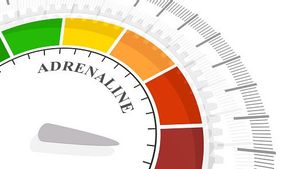YOGYAKARTA – Independence is a behavior that is expected for everyone. When you can do many things yourself without depending on others, it will certainly make you more productive. However, psychologists and counselors point out that there have been traumatic situations in the past that have led a person to choose to live too independently.
According to the American Psychological Association (APA) reported by PsychCentral, Wednesday, July 27, trauma is an emotional response to a terrifying event. This involves incidents that make a person feel isolated, such as accidents, assaults, repeated events, or ongoing harassment, to discrimination.
People who have experienced trauma are familiar with what psychology calls the fight, flight, or freeze response. When experiencing this, the nervous system responds in order to survive. Usually accompanied by symptoms such as anxiety, panic, depression, social withdrawal or aloofness, and physical symptoms such as headaches and stomach aches.
"The trauma response can be physical, mental, emotional, or a combination of the three," explains psychologist Dr. Nekeshia Hammond.

People who are too independent, they choose not to depend on everyone even though it can have a negative impact on them. Obviously, counselor and author Dr. Joanne Frederick, too independent appears as an 'me' versus 'we' perspective which is characterized by taking on too many tasks, refusing to help or helping, and having problems dividing tasks.
Experts link hyper-independence or being too independent with not being able to trust others so that you can only rely on yourself. This trait may have developed as an effort to protect oneself from the dangers that lie ahead. If hyper-independence is related to past trauma, it may develop without realizing it. So feel no problem and just walk away.
“Sometimes, the body and mind naturally find a way to survive the trauma. The whole idea was, 'I need to protect myself, so it doesn't happen to me again',” explains Frederick.
Trauma also makes a person often in a state of high alert. Hammond says that there may be a relationship between levels of vigilance and distrust of others. To overcome the tension in yourself that can trigger emotional exhaustion as well as physical exhaustion, you can follow the advice of experts.
First, no one wants to be disappointed. If you're afraid of being disappointed, you're not alone. Emotional wounds take time to heal, and it's legitimate to have doubts after experiencing a vulnerable period following the trauma. But keep in mind and reflect, doing everything yourself can be tiring. So try to receive the slightest support because it can positively affect mental and physical health.
VOIR éGALEMENT:
Second, it's okay to ask other people for help because it won't affect your independence or your overall abilities. Everyone sometimes needs help to feel supported by a strong support system.
Third, if you have experienced trauma or post-traumatic stress disorder (PTSD), psychotherapy can help you deal with thoughts, feelings, and behaviors that result from the traumatic experience.
That explains the link between overly independent behavior and traumatic experiences. Hammond said to motivate, everyone has their own way of managing trauma and developing coping skills. But it's important to know that having a strong response to trauma doesn't mean 'weak'.
The English, Chinese, Japanese, Arabic, and French versions are automatically generated by the AI. So there may still be inaccuracies in translating, please always see Indonesian as our main language. (system supported by DigitalSiber.id)


















